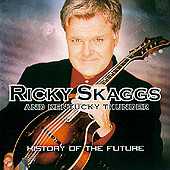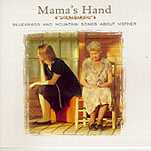• Del McCoury Band: Del and the Boys, Ceili Music, 2001.
• Ricky Skaggs: History of the Future, Skaggs Family/Rounder, 2001.
• Ricky Skaggs: Uncle Pen, Music Mill, 2002.
• Various: Mama’s Hand, Rounder, 2002.
 WITH the success of the O Brother, Where Art Thou? soundtrack, bluegrass music is enjoying its greatest popularity ever.
WITH the success of the O Brother, Where Art Thou? soundtrack, bluegrass music is enjoying its greatest popularity ever.
Along with Ralph Stanley, Del McCoury is the most popular old time act currently performing. A short stint singing and playing guitar with Bill Monroe in the early sixties first brought McCoury recognition, and his high lonesome sound has been popular ever since.
Always adventurous in his choice of covers, this time out he includes effective takes on the standard ‘Learnin’ the Blues’ and Jeannie Pruett’s ‘Count Me Out ‘ as well as a somewhat ill-advised — but imaginative — read of Richard Thompson’s ‘1952 Vincent Black Lightning.’ Buddy Greene’s ‘Recovering Pharisee’ deals with our capacity to see the faults in others while missing our own: “I’m a Pharisee in recovery/With new eyes I can see/A big sinner in me/It’s the way of my human heart/To confess other peoples sins/Reluctant to admit my part/Or the deeper problem within/but thank God/He won’t let me be/Or remain in my hypocrisy/Sooner or later/I’ll be on my knees.’ Another highlight is the original instrumental ‘Goldbrickin’ which manages to showcase the players’ impressive chops without sounding over the top.
 The disc’s title — Del and the Boys — can be taken literally – sons Rob and Ronnie (on banjo and mandolin) are members of the group, which has been together for over a decade. The sense of family is an ongoing theme for McCoury. . . his last album was entitled The Family, and he records for Ceili Music, an offshoot of Ricky Skaggs’ Skaggs Family label.
The disc’s title — Del and the Boys — can be taken literally – sons Rob and Ronnie (on banjo and mandolin) are members of the group, which has been together for over a decade. The sense of family is an ongoing theme for McCoury. . . his last album was entitled The Family, and he records for Ceili Music, an offshoot of Ricky Skaggs’ Skaggs Family label.
Still in his forties, Ricky Skaggs began his career early. Performing at a Bill Monroe show at six years old, sharing the stage with Flatt & Scruggs the following year, and the Stanley Brothers a few years later, he managed to rub shoulders with the top three names in bluegrass music by the time he was 10 years old. A few years later he was a full time member of Ralph Stanley’s Clinch Mountain Boys, and after stints with JD Crowe and the New South, the Country Gentlemen and his own group, Boone Creek, Skaggs came to the attention of the general public after joining Emmylou Harris’ legendary Hot Band in 1977.
Two years later he released his debut solo effort, Sweet Temptation. Proficient on guitar, mandolin, banjo and fiddle, and a first-rate vocalist, Skaggs quickly become a star, helping kick off the new traditionalist movement. Chet Atkins credited him with ‘single-handedly’ saving country music from the sanitized Urban Cowboy craze, wrestling sales back from the pre-fabricated industry acts. In the ’80s, he amassed 19 top 10 hits on the country charts, with 11 hitting the peak position.
 Unfortunately, due to the market’s cyclical nature, things were bound to change, and with the advent of the new country boom in the ’90s, Skaggs’ sales dropped precipitously, replaced by fresh faces in the industry’s attempt to stay current. His music was no longer seen as relevant by the powers that be; “The fact that I was making quality traditional country music just wasn’t cutting it on country radio. There was a culmination of many things coming to a head at the same time. I did a song once called ‘Life’s Too Long to Live Like This.’ I realized life is too long to be contractually under the thumb to produce something commercial. I just wouldn’t bow my knee to the god of country radio. I’m either going to play the music I want to play for the rest of my life, or I’m not going to play at all.”
Unfortunately, due to the market’s cyclical nature, things were bound to change, and with the advent of the new country boom in the ’90s, Skaggs’ sales dropped precipitously, replaced by fresh faces in the industry’s attempt to stay current. His music was no longer seen as relevant by the powers that be; “The fact that I was making quality traditional country music just wasn’t cutting it on country radio. There was a culmination of many things coming to a head at the same time. I did a song once called ‘Life’s Too Long to Live Like This.’ I realized life is too long to be contractually under the thumb to produce something commercial. I just wouldn’t bow my knee to the god of country radio. I’m either going to play the music I want to play for the rest of my life, or I’m not going to play at all.”
In the ’90s Skaggs severed ties with his mainstream record label, which led to numerous career changes: “I had been sensing that the Lord had been saying to me, ‘I want you to be where hurting people are, to be where people need to hear of my love.'” He started his own family-run business, downsized production, and returned to his bluegrass roots. “I cut my band from 15 musicians to 8. I got rid of a tractor-trailer and a bus. We didn’t need a huge stage full of amps and drums and pianos and electric equipment to put on a show.”
This new-found mobility enables him to play smaller venues, including churches, casinos and schools.
History of the Future includes a variety of tunes that work together as a strong, cohesive set, including numbers made famous by the Stanley Brothers and Bill Monroe, some familiar standards including ‘Shady Grove’ and ‘Rollin’ in My Sweet Baby’s Arms’ and ‘Dim Lights Thick Smoke.” A few newer songs include an original instrumental that pays tribute to Skaggs’ Scottish-Irish ancestry, and ‘Halfway Home Café’ by Paul Overstreet, which is described by Skaggs as “a powerful message of forgiveness and reconciliation — something I always need.”
Uncle Pen is made up of songs famous by Bill Monroe. Taken from previously released Skaggs discs recorded throughout the ’80s, and collected together on one disc, it makes for an enjoyable tribute.
Mama’s Hand offers 19 songs espousing the value of motherhood. Outside of Rhonda Vincent’s ‘Medals for Mothers,’ all tracks have been previously released on the Rounder label.
Acts range from veterans — Jim & Jesse, Doc Watson, The Blue Sky Boys, Hazel Dickens — to more recent, less familiar names. Noted scribe Charles Wolfe provides a short essay tracing each song’s origin and offering a history of the genre.
A stalwart in every bluegrass and old-time country artist’s repertoire, the subject matter runs the risk of becoming maudlin, but for the most part this remains a sober, if at times sombre, collection.
© John Cody 2002
